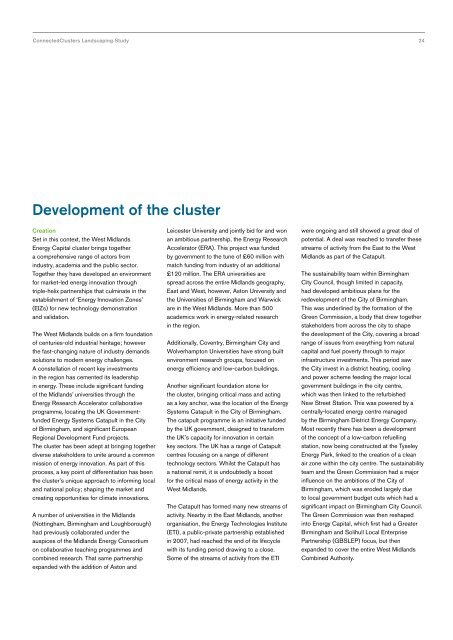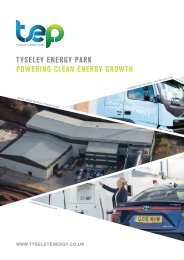connected-clusters-report-energy
Clustering innovation to create thriving and prosperous low-carbon cities and regions
Clustering innovation to create thriving and prosperous low-carbon cities and regions
Create successful ePaper yourself
Turn your PDF publications into a flip-book with our unique Google optimized e-Paper software.
ConnectedClusters Landscaping Study 24<br />
Development of the cluster<br />
Creation<br />
Set in this context, the West Midlands<br />
Energy Capital cluster brings together<br />
a comprehensive range of actors from<br />
industry, academia and the public sector.<br />
Together they have developed an environment<br />
for market-led <strong>energy</strong> innovation through<br />
triple-helix partnerships that culminate in the<br />
establishment of ‘Energy Innovation Zones’<br />
(EIZs) for new technology demonstration<br />
and validation.<br />
The West Midlands builds on a firm foundation<br />
of centuries-old industrial heritage; however<br />
the fast-changing nature of industry demands<br />
solutions to modern <strong>energy</strong> challenges.<br />
A constellation of recent key investments<br />
in the region has cemented its leadership<br />
in <strong>energy</strong>. These include significant funding<br />
of the Midlands’ universities through the<br />
Energy Research Accelerator collaborative<br />
programme, locating the UK Governmentfunded<br />
Energy Systems Catapult in the City<br />
of Birmingham, and significant European<br />
Regional Development Fund projects.<br />
The cluster has been adept at bringing together<br />
diverse stakeholders to unite around a common<br />
mission of <strong>energy</strong> innovation. As part of this<br />
process, a key point of differentiation has been<br />
the cluster’s unique approach to informing local<br />
and national policy; shaping the market and<br />
creating opportunities for climate innovations.<br />
A number of universities in the Midlands<br />
(Nottingham, Birmingham and Loughborough)<br />
had previously collaborated under the<br />
auspices of the Midlands Energy Consortium<br />
on collaborative teaching programmes and<br />
combined research. That same partnership<br />
expanded with the addition of Aston and<br />
Leicester University and jointly bid for and won<br />
an ambitious partnership, the Energy Research<br />
Accelerator (ERA). This project was funded<br />
by government to the tune of £60 million with<br />
match funding from industry of an additional<br />
£120 million. The ERA universities are<br />
spread across the entire Midlands geography,<br />
East and West, however, Aston University and<br />
the Universities of Birmingham and Warwick<br />
are in the West Midlands. More than 500<br />
academics work in <strong>energy</strong>-related research<br />
in the region.<br />
Additionally, Coventry, Birmingham City and<br />
Wolverhampton Universities have strong built<br />
environment research groups, focused on<br />
<strong>energy</strong> efficiency and low-carbon buildings.<br />
Another significant foundation stone for<br />
the cluster, bringing critical mass and acting<br />
as a key anchor, was the location of the Energy<br />
Systems Catapult in the City of Birmingham.<br />
The catapult programme is an initiative funded<br />
by the UK government, designed to transform<br />
the UK’s capacity for innovation in certain<br />
key sectors. The UK has a range of Catapult<br />
centres focusing on a range of different<br />
technology sectors. Whilst the Catapult has<br />
a national remit, it is undoubtedly a boost<br />
for the critical mass of <strong>energy</strong> activity in the<br />
West Midlands.<br />
The Catapult has formed many new streams of<br />
activity. Nearby in the East Midlands, another<br />
organisation, the Energy Technologies Institute<br />
(ETI), a public-private partnership established<br />
in 2007, had reached the end of its lifecycle<br />
with its funding period drawing to a close.<br />
Some of the streams of activity from the ETI<br />
were ongoing and still showed a great deal of<br />
potential. A deal was reached to transfer these<br />
streams of activity from the East to the West<br />
Midlands as part of the Catapult.<br />
The sustainability team within Birmingham<br />
City Council, though limited in capacity,<br />
had developed ambitious plans for the<br />
redevelopment of the City of Birmingham.<br />
This was underlined by the formation of the<br />
Green Commission, a body that drew together<br />
stakeholders from across the city to shape<br />
the development of the City, covering a broad<br />
range of issues from everything from natural<br />
capital and fuel poverty through to major<br />
infrastructure investments. This period saw<br />
the City invest in a district heating, cooling<br />
and power scheme feeding the major local<br />
government buildings in the city centre,<br />
which was then linked to the refurbished<br />
New Street Station. This was powered by a<br />
centrally-located <strong>energy</strong> centre managed<br />
by the Birmingham District Energy Company.<br />
Most recently there has been a development<br />
of the concept of a low-carbon refuelling<br />
station, now being constructed at the Tyseley<br />
Energy Park, linked to the creation of a clean<br />
air zone within the city centre. The sustainability<br />
team and the Green Commission had a major<br />
influence on the ambitions of the City of<br />
Birmingham, which was eroded largely due<br />
to local government budget cuts which had a<br />
significant impact on Birmingham City Council.<br />
The Green Commission was then reshaped<br />
into Energy Capital, which first had a Greater<br />
Birmingham and Solihull Local Enterprise<br />
Partnership (GBSLEP) focus, but then<br />
expanded to cover the entire West Midlands<br />
Combined Authority.




